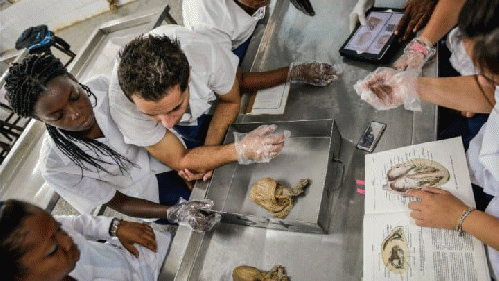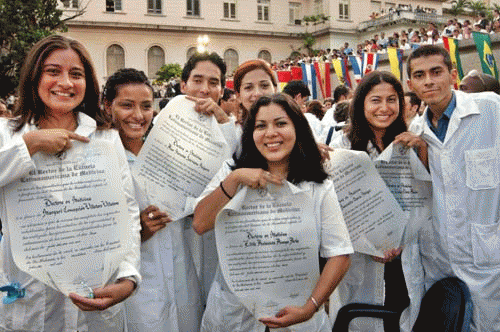Reprinted from Greanville Post
On July 1, 2015, President Obama announced the re-establishment of full diplomatic relations with Cuba. The process has followed a carefully developed time-line. The President himself described the US policy that has been followed since 1962 as:
"A Failed Approach: Decades of U.S. isolation of Cuba have failed to accomplish our objective of empowering Cubans to build an open and democratic country. (sic) At times, longstanding U.S. policy towards Cuba has isolated the United States from regional and international partners, constrained our ability to influence outcomes throughout the Western Hemisphere, and impaired the use of the full range of tools available to the United States to promote positive change in Cuba. Though this policy has been rooted in the best of intentions, it has had little effect -- today, as in 1961, Cuba is governed by the Castros and the Communist party.
"We cannot keep doing the same thing and expect a different result. It does not serve America's interests, or the Cuban people, to try to push Cuba toward collapse. We know from hard-learned experience that it is better to encourage and support reform than to impose policies that will render a country a failed state. We should not allow U.S. sanctions to add to the burden of Cuban citizens we seek to help."
Of course, the U.S. economic embargo of Cuba, which has been in place since the early 1960s and was significantly strengthened under Bill Clinton (!), has done much to hold back the normal development of Cuba. It is the product of Congressional legislation, and the Repub. Congress has made it clear that there will be no change in that policy as long as it remains in charge of it. The objective of the embargo (and non-recognition as well), has always been stated by the U.S. supporters of it to be the "empowering [of] Cubans to build an open and democratic country." (These open policies have also been accompanied by on an ongoing secret campaign against the government of Cuba by the CIA and presumably other U.S. government, and perhaps non-government, agencies, to overthrow the Cuban government. This campaign has included a total of over 600 documented assassination attempts on Fidel Castro alone, which is about one a month on the average since the U.S. broke off relations at about the time of the Bay of Pigs attempted invasion in 1961.)
Doctors from all over the Third World are trained for free at the Latin American School of Medicine in Havana(ELAM), which is one of the world's most advanced medical schools.
Well, let's take a look at what Cuba and the Cuban people would have and not have, in terms of the present structure and function of Cuban society, were the senaters' demands to be the case. These observations were made during the course of a week-long trip that my wife and I recently made to Cuba.
Fascinating stuff, really. First off, Cuba would not have the national health service that it presently has that provides free health care to all Cubans, and also to foreign visitors who didn't happen to travel with emergency health insurance. (Of course, "Medicare for All," as a national health service is currently characterized by its supporters in the United States, given the present political and economic realities, is presently nothing but a pipe-dream.) We were told of one U.S. national who didn't have the insurance, had to be taken to hospital for an acute emergency, was treated totally properly, and tried to offer the hospital payment in cash. The hospital couldn't accept it because no hospital in Cuba has an office to carry out such functions.
Cuba would not have free education, from pre-school through graduate school. Cuba would not have an educational system for children/persons with developmental disabilities which a) provides for training so that each can become self-supporting as an adult if possible, and b) if not, then provides residential care for them for the rest of their lives. Cuba would not have a virtual 100% literacy rate (one of the first major accomplishments of the Cuban revolution).
By contrast, in 2013 in the United States, 32 million adults could not read, giving an illiteracy rate of 14%. Cuba does have an AIDS problem, but unlike in the early days, gay persons are not the subject of official discrimination. Although heroin use is illegal, unlike in the United States there is a national program for supplying free clean needles to addicts (which vastly reduces the incidence of AIDS transmission).
In Cuba there are very few police on the streets, at least in the three major cities we visited, Havana, Cienfuegos, and Santiago de Cuba. Of those that there are, we only saw one who carried a pistol. We did see several who had empty holsters. Although the population is about 35% Afro-Cuban, it is unlikely that there are very many random shootings of unarmed black men by police. We were told that there is a certain degree of racism among the generally equal thirds of Cuban society divided between the Latinos, the Mestizos and the Afro-Cubans. But there is certainly no official government-sponsored discrimination against Afro-Cubans and, since there is only one political party, there is none that runs on racism or on homophobia either (as does the party of Senators Cruz and Rubio). And so on and so forth.
Certainly Fidel and the other leadership of the Communist Party of Cuba give full credit to Cuban communism, for the great achievements that have been realized, even in the face of the (so far) 55 Years War that the United States has waged against Cuba. It happens, that a good friend of mine, and fellow Contributing Editor for The Greanville Post, Michael Faulkner, was in Cuba to hear one of Fidel's early speeches on the same subject. The revolutionary theory of how to construct a society that can work for all of its people is of course vital, and needs to be explained and substantiated over and over again, through the course of history.
But, I think that, in promoting the Cuban Revolution, in addition to correctly talking about the theory, it is vital also to talk about the practice, to talk about what the Cuban Revolution has achieved in practical terms for its people, especially in the context of the "55 Years War" waged against it by the United States.
Would the Cuban people really like to have the Cruzbio "U.S." model imposed on them, and then lose everything they have gained over the years, in return for having an "opposition party" or two, which if it/they were to be modelled on the Repubs so close to the Cruzbio model, could actually run on racism and homophobia, while destroying the national health and free national education?
I don't think so.
Go Cuba! Let's sell the system!








